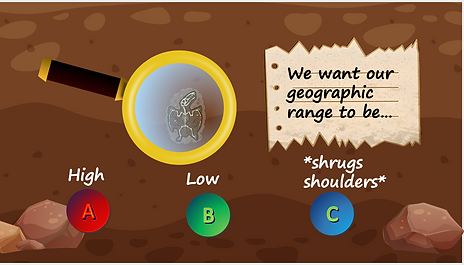HI.
I'M JOOD.
I STUDY THE HISTORY OF LIFE AND EARTH.
Who is
Dr. Jood Al Aswad?
I study how ocean life survives Earth’s worst catastrophes in deep time. I aim to understand what traits tip the balance between extinction and endurance by using physiology, ocean conditions, and evolutionary history to explain who survives global crises and how.
I certainly found my niche in paleobiology!
Aside from that, I have many passions that drive me and shape who I am. One of my goals is in student outreach within the realm of geosciences. To my knowledge, I am the first female Saudi paleontologist. I also draw digitally and with charcoal, and sometimes use that for science. The magnum opus of my creative endeavors is a high fantasy novel I am in the works of writing and hope to publish someday, and incorporates elements of geology into it!
Snapshot of my research: A phenomenon known as taxonomic homogenization, in which ecosystems are reduced in their spatial diversity as native fauna become replaced by invasive species, has been known to occur following the end-Permian mass extinction (~252 million years ago), but the mechanisms driving this pattern is unknown. In articles published at Stanford and Discover Magazine, we call this phenomenon the "Great Dulling" , since ecosystems became compositionally more similar regardless of how far apart they were in the world. My research, published in Science Advances, explains this pattern via the survival of organisms that were physiologically able to tolerate warmer, lower-oxygen ocean conditions after the extinction event. As the oceans became more uniformly hot and oxygen-poor, these survivors were able to expand into new habitats by taking advantage of aerobic niches that less tolerant species could no longer occupy.
I also identify the fossils of marine invertebrates that survived the direct aftermath of the end-Permian mass extinction. Read my article on some of the field work I conducted on earliest Triassic bivalves in Saudi Arabia, which intertwined lessons from my family history and from ancient history in one of Saudi Arabia's top newspapers, Al-Riyadh newspaper, here !
Learn more about my research here.

TEACHING
I love to teach! So far, I've taught university level classes that encompass a wide range of students from freshmen majoring in humanities to PhD students in paleobiology; community college classes in physical geography and climate change; undergraduate-level introductory courses in paleobiology; and more!
My teaching philosophy is all about creating engaging, student-centered learning experiences.
I use backward course design and active learning to make sure every class is built around clear goals that help students succeed. By connecting learning outcomes, assessments, and classroom activities, I want to help students develop a deep understanding of Earth systems and how life and our planet shape one another.
I’ve had the chance to teach and assist in courses on the coevolution of life and Earth, paleobiology, macroevolution, climate change, physical geography, and mass extinctions, and have prepared for courses in oceanography, marine ecology, geology, and biogeography.
Teaching these topics has been incredibly rewarding, and in 2025 I was honored to receive Stanford’s Centennial Teaching Assistant Award for my work in these classes!



Here's an example of a game I created, using publicly available resources, for the Sixth Mass Extinction (and the Other Five) class which explore the modern and past biodiversity crises. In this game, students vote on a variety of choices based on things they learned in class to help their creature survive the end-Permian mass extinction. Contact me for more information about this game!
Rules: Get at least 500 points to survive the end-Permian mass extinction. Vote on Polleverywhere. For each question, the answer with the highest submissions will be chosen.
Education

2019 - 2025
Stanford University
Ph.D. Geological Sciences (Paleobiology)
Advised by: Dr. Jon Payne
Dissertation title: "Climatic and taxonomic controls on ecosystem simplification and connectedness across time and space."
2017 - 2019
Cornell University
M.S. Geological Sciences (Stratigraphy and Petrophysics)
Advised by: Dr. Teresa Jordan
Thesis title: "A stratigraphic and petrophysical study of in-situ geothermal reservoir quality of the Cambro-Ordovician subsurface a Cornell University, Ithaca, New York"
2011 - 2016
George Mason University
B.S. Earth Science, concentration in Geology
Advised by: Dr. Linda Hinnov
Research Project: “The harmonic analysis of geophysical phenomena recorded by borehole strainmeters.”
Summer 2021
Friday Harbor Laboratories - University of Washington
Marine Invertebrate Zoology
South Dakota School of Mines and Technology
Field Camp
Summer 2015